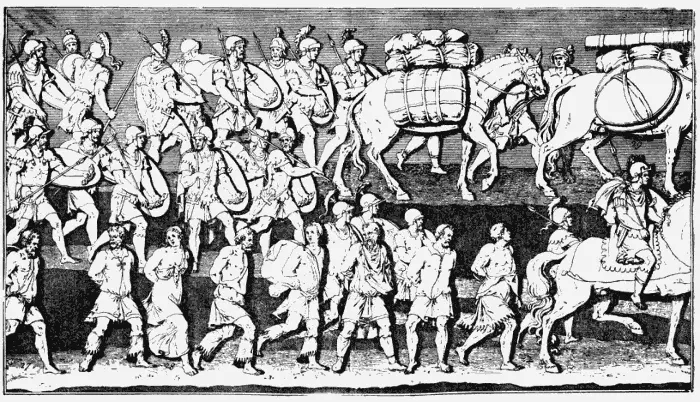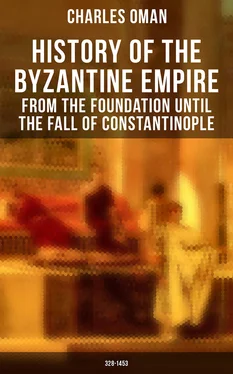The battle of Adrianople was the most fearful defeat suffered by a Roman army since Cannæ, a slaughter to which it is aptly compared by the contemporary historian Ammianus Marcellinus. The army of the East was almost annihilated, and was never reorganized again on the old Roman lines.
This awful catastrophe brought down on Constantinople the first attack which it experienced since it had changed its name from Byzantium. After a vain assault on Adrianople, the victorious Goths pressed rapidly on towards the imperial city. Harrying the whole country side as they passed by, they presented themselves before the “Golden Gate,” its south-western exit. But the attack was destined to come to nothing: “their courage failed them when they looked on the vast circuit of walls and the enormous extent of streets; all that mass of riches within appeared inaccessible to them. They cast away the siege machines which they had prepared, and rolled backward on to Thrace.”3 Beyond skirmishing under the walls with a body of Saracen cavalry which had been brought up to strengthen the garrison, they made no hostile attempt on the city. So forty years after his death, Constantine's prescience was for the first time justified. He was right in believing that an impregnable city on the Bosphorus would prove the salvation of the Balkan Peninsula even if all its open country were overrun by the invader.
The unlucky Valens was succeeded on the throne by Theodosius, a wise and virtuous prince, who set himself to repair, by caution and courage combined, the disaster that had shaken the Roman power in the Danube lands. With the remnants of the army of the East he made head against the barbarians; without venturing to attack their main body, he destroyed many marauders and scattered bands, and made the continuance of the war profitless to them. If they dispersed to plunder they were cut off; if they held together in masses they starved. Presently Fritigern died, and Theodosius made peace with his successor Athanarich, a king who had lately come over the Danube at the head of a new swarm of Goths from the Carpathian country. Theodosius frankly promised and faithfully observed the terms that Fritigern had asked of Valens ten years before. He granted the Goths land for their settlement in the Thracian province which they had wasted, and enlisted in his armies all the chiefs and their war-bands. Within ten years after the fight of Adrianople he had forty thousand Teutonic horsemen in his service; they formed the best and most formidable part of his host, and were granted a higher pay than the native Roman soldiery. The immediate military results of the policy of Theodosius were not unsatisfactory; it was his Gothic auxiliaries who won for him his two great victories over the legions of the West, when in a.d. 388 he conquered the rebel Magnus Maximus, and in a.d. 394 the rebel Eugenius.
 Gothic Captives. ( From the Column of Arcadius. )
Gothic Captives. ( From the Column of Arcadius. )
But from the political side the experiment of Theodosius was fraught with the greatest danger that the Roman Empire had yet known. When barbarian auxiliaries had been enlisted before, they had been placed under Roman leaders and mixed with equal numbers of Roman troops. To leave them under their own chiefs, and deliberately favour them at the expense of the native soldiery, was a most unhappy experiment. It practically put the command of the empire in their hands; for there was no hold over them save their personal loyalty to Theodosius, and the spell which the grandeur of the Roman name and Roman culture still exercised over their minds. That spell was still strong, as is shown in the story which the Gothic historian Jornandes tells about the visit of the old King Athanarich to Constantinople. “When he entered the royal city, ‘Now,’ said he, ‘do I at last behold what I had often heard and deemed incredible.’ He passed his eyes hither and thither admiring first the site of the city, then the fleets of corn-ships, then the lofty walls, then the crowds of people of all nations, mingled as the waters from divers springs mix in a single pool, then the ranks of disciplined soldiery. And at last he cried aloud, ‘Doubtless the Emperor is as a god on earth, and he who raises a hand against him is guilty of his own blood.’ ” But this impression was not to continue for long. In a.d. 395, the good Emperor Theodosius, “the lover of peace and of the Goths,” as he was called, died, and left the throne to his two weakly sons Arcadius and Honorius.
IV. The Departure Of The Germans.
Table of Contents
The Roman Empire, at the end of the fourth century, was in a condition which made the experiment of Theodosius particularly dangerous. The government was highly centralized and bureaucratic; hosts of officials, appointed directly from Constantinople, administered every provincial post from the greatest to the least. There was little local self-government and no local patriotism. The civil population was looked on by the bureaucratic caste as a multitude without rights or capacities, existing solely for the purpose of paying taxes. So strongly was this view held, that to prevent the revenue from suffering, the land-holding classes, from the curialis , or local magnate, down to the poorest peasant, were actually forbidden to move from one district to another without special permission. A landowner was even prohibited from enlisting in the army, unless he could show that he left an heir behind him capable of paying his share in the local rates. An almost entire separation existed between the civil population and the military caste; it was hard for a civilian of any position to enlist; only the lower classes—who were of no account in tax-paying—were suffered to join the army. On the other hand, every pressure was used to make the sons of soldiers continue in the service. Thus had arisen a purely professional army, which had no sympathy or connection with the unarmed provincials whom it protected.
The army had been a source of unending trouble in the third century; for a hundred years it had made and unmade Cæsars at its pleasure. That was while it was still mainly composed of men born within the empire, and officered by Romans.
But Theodosius had now swamped the native element in the army by his wholesale enlistment of Gothic war-bands. And he had, moreover, handed many of the chief military posts to Teutons. Some of them indeed had married Roman wives and taken kindly to Roman modes of life, while nearly all had professed Christianity. But at the best they were military adventurers of alien blood while at the worst they were liable to relapse into barbarism, cast all their loyalty and civilization to the winds, and take to harrying the empire again in the old fearless fashion of the third century. Clearly nothing could be more dangerous than to hand over the protection of the timid and unarmed civil population to such guardians. The contempt they must have felt for the unwarlike provincials was so great, and the temptation to plunder the wealthy cities of the empire so constant and pressing, that it is no wonder if the Teutons yielded. Cæsar-making seemed as easy to the leaders as the sack of provincial churches and treasuries did to the rank and file.
When the personal ascendency of Theodosius was removed, the empire fell at once into the troubles which were inevitable. Both at the court of Arcadius, who reigned at Constantinople, and at that of Honorius, who had received the West as his share, a war of factions commenced between the German and the Roman party. Theodosius had distributed so many high military posts to Goths and other Teutons, that this influence was almost unbounded. Stilicho Magister militum (commander-in-chief) of the armies of Italy was predominant at the council board of Honorius; though he was a pure barbarian by blood, Theodosius had married him to his own niece Serena, and left him practically supreme in the West, for the young emperor was aged only eleven. In the East Arcadius, the elder brother, had attained his eighteenth year, and might have ruled his own realm had he possessed the energy. But he was a witless young man, “short, thin, and sallow, so inactive that he seldom spoke, and always looked as if he was about to fall asleep.” His prime minister was a Western Roman named Rufinus, but before the first year of his reign was over, a Gothic captain named Gainas slew Rufinus at a review, before the Emperor's very eyes. The weak Arcadius was then compelled to make the eunuch Eutropius his minister, and to appoint Gainas Magister militum for the East.
Читать дальше

 Gothic Captives. ( From the Column of Arcadius. )
Gothic Captives. ( From the Column of Arcadius. )










